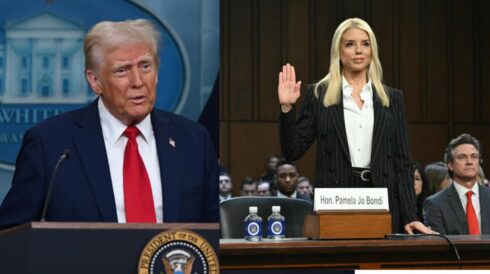President Donald Trump has directed Attorney General Pam Bondi to investigate and seek punitive measures against law firms and attorneys involved in what he describes as “frivolous, unreasonable, and vexatious litigation” against his administration. The sweeping directive, outlined in a memorandum, signals an aggressive approach to counteract legal challenges that have disrupted key policies.
Trump’s order instructs Bondi to review litigation spanning the past eight years—covering both of his presidential terms—to identify cases of alleged misconduct. Potential penalties include revoking security clearances, terminating federal contracts with implicated firms, and referring cases for further executive action. The Trump administration argues that these measures are necessary to prevent politically motivated lawsuits from obstructing government operations.
This move follows a series of legal setbacks for the Trump administration, including multiple temporary injunctions issued by federal judges. The president has long criticized these judicial rulings, framing them as politically driven obstacles designed to undermine his governance.
Targeting Law Firms: A Pattern of Retribution?
In what critics see as part of a broader campaign against perceived adversaries in the legal community, the Trump administration has already acted against prominent law firms. Covington & Burling, a Washington-based firm that provided legal services to Special Counsel Jack Smith, saw several of its attorneys’ security clearances suspended. Similarly, the administration targeted Paul Weiss, a firm linked to former Manhattan prosecutor Mark Pomerantz, over past legal actions against Trump.
Paul Weiss reportedly had its sanctions lifted only after its chairman, Brad Karp, made several concessions, including distancing the firm from Pomerantz and committing to legal services for causes aligned with Trump’s agenda. These actions have raised concerns that the administration is leveraging its executive authority to punish firms representing clients in cases challenging government policies.
The White House, however, maintains that the crackdown is a necessary step toward restoring legal accountability. “For too long, partisan law firms have exploited the system to obstruct the will of the people,” a senior administration official stated. “We are committed to ensuring fairness and stopping abuse of the legal process.”
Legal Experts Warn of Chilling Effect on Litigation
Legal scholars and civil rights advocates have voiced concerns that Trump’s directive could have far-reaching implications for the legal profession. By subjecting attorneys to potential retribution for representing clients in cases against the government, they argue, the administration may be discouraging legitimate legal challenges out of fear of retaliation.
“If law firms fear losing security clearances or federal contracts simply for taking on cases that the administration disapproves of, it undermines the fundamental right to legal representation,” said constitutional law expert Professor Richard Levin. “This could create a chilling effect where attorneys hesitate to pursue valid claims against government actions.”
Some experts have also pointed out that the directive encroaches on the independence of the judiciary. While the Attorney General can seek sanctions against attorneys, such disciplinary actions are ultimately the prerogative of the courts. Trump’s memorandum, however, establishes a mechanism for the White House to intervene directly, raising constitutional questions about the separation of powers.
Bondi’s Plan to Challenge Federal Judges
In addition to investigating law firms, Attorney General Pam Bondi has signaled an intent to challenge federal judges who have issued rulings unfavorable to the administration. She has described such decisions as “unconstitutional” and vowed to appeal them vigorously.
One of the most contentious cases involves a ruling by U.S. District Judge James Boasberg, who temporarily blocked the administration from deporting Venezuelan nationals under the Alien Enemies Act of 1798. The White House has criticized the decision as judicial overreach and is reportedly considering invoking the rarely used state secrets privilege to limit court scrutiny.
“We cannot allow unelected judges to dictate policy based on political bias,” Bondi stated during a recent press briefing. “The Department of Justice will take all necessary steps to challenge these unconstitutional rulings.”
Bondi’s remarks suggest a more combative legal strategy moving forward, with the administration willing to escalate disputes with the judiciary. This stance is expected to trigger further legal battles and deepen tensions between the executive and judicial branches.
Political and Legal Ramifications of Trump’s Directive
Trump’s aggressive approach to legal opposition has drawn sharp reactions from both supporters and critics. His allies praise the initiative as a long-overdue measure to rein in politically motivated litigation. “The president is standing up to activist lawyers who abuse the system to block his policies,” said Senator Josh Hawley. “This is about ensuring that justice is not weaponized for partisan ends.”
Opponents, however, argue that the directive represents an unprecedented effort to silence legal dissent. “This is a dangerous assault on the rule of law,” said House Minority Leader Hakeem Jeffries. “The president is effectively using his executive power to intimidate those who hold him accountable.”
As the administration moves forward with its investigations and potential sanctions, legal battles over the scope of executive authority are likely to intensify. The directive sets the stage for a prolonged confrontation between the Trump White House and the legal community, with significant implications for the balance of power in the U.S. government.














